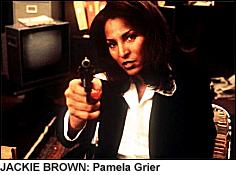![[Deep Focus]](../../flicker/logo.gif) |
|
|
JACKIE BROWN | |
 |
GRADE: B |
|
Cinematic wunderkind Quentin Tarantino, who dazzled hipsters, B-movie buffs and that tough crowd at Cannes with his tough-talking Pulp Fiction, follows it up with Jackie Brown, a refreshingly modest piece of work that belies his reputation as a show-off. If Jackie Brown seems a trifle over-baked, it may be only that its two-and-a-half hour running time is ill-suited to the quick-and-dirty scamming and dealmaking that turns the plot. Jackie Brown's first act is a motormouthed marvel of exposition. Boiling down Elmore Leonard's novel Rum Punch to the bare essentials (and transforming the lead character into a loving star vehicle for still-reigning blaxploitation queen Pam Grier), Tarantino first introduces fast-talking Ordell Robbie, a gun runner whose circle of "friends" includes a wide assortment of low-lifes and desperate characters -- Robert De Niro as the slow-witted Louis Gara, Bridget Fonda as brain-addled pothead Melanie, whom he keeps around for show, and Chris Tucker as the hapless Beaumont Livingston, who poses the first in Ordell's long series of problems. Problems beget problems, and pretty soon the feds have got the goods on Jackie Brown (Grier), a flight attendant on a cut-rate airline who makes pick-ups and deliveries for Ordell on her frequent trips across the border into Mexico. Beaumont winds up dead, and Jackie has good reason to believe that she'll be next -- unless, that is, she can figure out a way to keep Ordell from crossing her long enough so she can figure out a way to cross him. She'll get help from ATF agent Ray Nicolet (Michael Keaton), who wants her to help nail Ordell as part of a plea bargain, and a weatherbeaten bail bondsman named Max Cherry (Robert Forster, who once upon a time played detective Miles Banyon on TV's Banyon) who develops a crush on Jackie when Ordell has him spring her from jail. The ensuing plot, which involves a half million dollars of Ordell's money that has yet to be delivered into the states, involves enough twists and turns and broken promises to satisfy any adherent of the crime genre. Only problem is, even though it chugs right along until Jackie first grabs the upper-hand from Ordell, it eventually flattens out. Quentin the screenwriter would have been wise to tighten up a lot of the scenes where desperately flat characters like Louis and Melanie chat with each other. The film is almost too easy to follow -- if we didn't know what everybody was thinking all the time, it might have livened up the second half considerably. The only stand-out scenes are a couple of unexpected murders, along with Tarantino's gimmicky handling of a crucial money drop, which is played three times from the point of view of three different characters. It's clever, and it does increase narrative tension by filling us in on the situation bit by bit, but it's ultimately a distraction. Better, I think, to rewrite the scene for maximum tension and just play it through once. But those are quibbles, and Tarantino has still made an absorbing crime film that doubles as homage and triples as a sweetly serious character study. In creating an unconventional (and smartly acted) romance between Grier's 40-something Jackie Brown and Forster's 50-something Max Cherry, Tarantino shows a real affection for unconventional characters. In addition, he lets these fine actors -- some would say they're past their prime, but they'd be wrong, and I hope they both parlay this into renewed careers -- once again create the kind of people who used to populate films noir and exploitation pictures, before every character was expected to be a fast-talking smart-ass. Pulp Fiction, in particular, has contributed to a dreadful sameness in certain American movies, and Jackie Brown capably bucks that trend. By scaling back his ambitions, Tarantino actually comes across as more ambitious and more capable, at least to those of us who had feared Jackie Brown would be a pointless Pulp Fiction, Part Deux. The late writer-director Sam Fuller (Pickup on South Street, Shock Corridor), who gets a heartfelt "Thanks for everything" credit at the end of Jackie Brown, used to crank out one movie like this per year, sometimes more. Let's hope Tarantino takes a hint from his forebears and doesn't spend three years figuring out his next step. | |
|
Written and directed by Quentin Tarantino Based on the novel Rum Punch by Elmore Leonard Cinematography by Guillermo Navarro Edited by Sally Menke Starring Pam Grier, Robert Forster, and Samuel L. Jackson
Theatrical aspect ratio: 1.85:1
| |

| |
 http://www.deep-focus.com/dfweblog/
bryant@deep-focus.com
http://www.deep-focus.com/dfweblog/
bryant@deep-focus.com